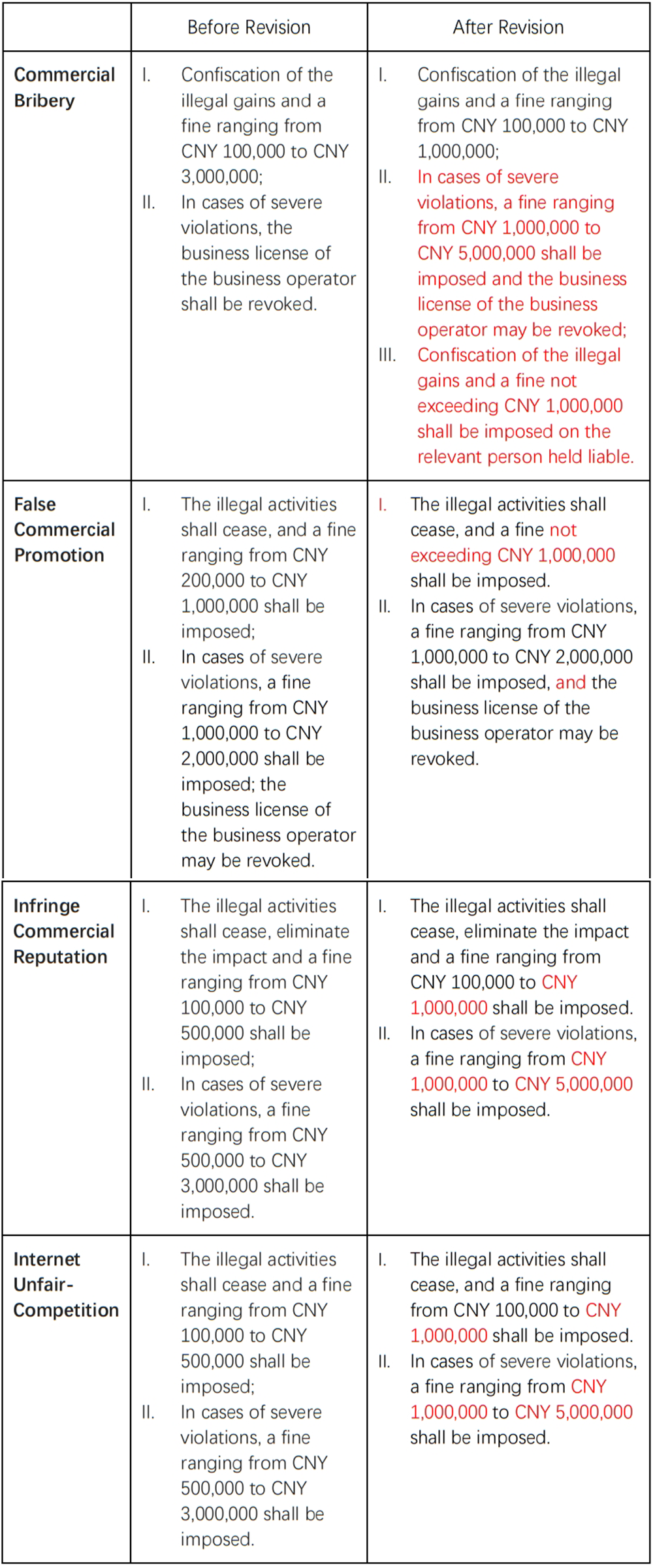2025 China’s Anti-Unfair Competition Law Revision: Key Takeaways
2025 China’s Anti-Unfair Competition Law Revision: Key Takeaways
I.Background of the Revision
On June 27, 2025, the 16th meeting of the Standing Committee of the 14th National People’s Congress officially adopted the Anti-Unfair Competition Law of the People’s Republic of China (2025 Revision) (the “Revised AUCL”). The Revised AUCL is set to take effect on October 15, 2025, aiming to address emerging competition issues stemming from the rapid development of the internet and digital economies. The updated legislation seeks to refine regulations governing the digital economy, regulate Internet competition, and enhance protection for trademarks, data, and privacy.
II.Key Modifications
Expanded Scope of Unfair Competition
Article 7 of the Revised AUCL expands the definition of “names” to include “usernames”. It specifies that unauthorized use of another entity’s prominent new media usernames, application names, or icons constitutes acts of confusion. This article prohibits business operators from assisting others in engaging in such activities.
Article 7 also prohibits unauthorized use of another entity’s registered or well-known unregistered trademark, product name, or business name. Such use includes setting these elements as search keywords without permission, misleading consumers into believing the goods are those of others or are associated with others. This addresses the problem of some operators leveraging others’ well-known trademarks to deceive consumers in online search scenarios.
Before the implementation of the Revised AUCL, judicial cases have already established that usernames fell within the scope of protection.
Representative Case: Shanghai Intellectual Property Court’s 2019 Landmark Cases on Strengthened IP Protection.
Jiang Yilei, popularly known by her username as “Papi”, amassed fame and economic benefits from her original comedic short videos. The court ruled that Jiang was qualified as a business operator under the Anti-Unfair Competition Law. The defendant extensively used her username, with phrases such as “Papi is here” and “Papi says”, directly leading the public to mistakenly believe Jiang was associated with or authorized the infringing products. As such, the court ruled that the defendant’s actions constituted unfair competition, as they exploited Jiang’s reputation for improper gains by using her username without authorization, in violation of principles of good faith and business ethics.
Enhanced Regulation of False Promotions and Fake Reviews
Article 9 of the Revised AUCL explicitly prohibits business operators from engaging in false or misleading commercial promotions regarding their products and services, which could deceive or mislead consumers and other business operators. “Fake reviews” have been added as a form of false commercial promotions, and the phrase “or assist others to” has been included, broadening the scope to encompass other business operators who may also be harmed.
The Revised AUCL responds to misleading and fake reviews in e-commerce which is a common phenomenon with the rapid development of Internet economy. In the following case, the court ruled that reviews disparaging others’ products to promote its own constitute unfair competition.
Representative Case: 2024 Intellectual Property Representative Cases by the Supreme People’s Court
A Suzhou-based e-commerce company published a sunscreen clothing review on social media. The review compared eight brands of sunscreen clothing, using test data and commentary to highlight that Brand B’s products were more effective than Brand A’s. However, there was no evidence that the results were based on identical testing environments and conditions. As a result, the ultraviolet protection data for Brand A and Brand B presented in the review lacked a reliable scientific basis, which could mislead the public and affect consumers’ purchasing decisions.
The court analyzed the legitimacy of online product review behaviors. It found that some reviews were based on false facts and concealed defects to mislead consumers. Some reviews even conducted marketing under the guise of reviews, deviating from the original purpose of the reviews. The court ruled that such actions constituted unfair competition through false advertising.
Detailed Internet-Specific Provisions
Article 13 of the Revised AUCL specifies that business operators shall not use data, algorithms, technologies, or platform rules to disrupt the normal operation of network products or services of other business operators. This article also prohibits obtaining or using data from other business operators through improper means, such as fraud, coercion, or abuse of platform rules.
Strengthened Penalties
Personal liability: Under the Revised AUCL, if a business operator violates bribery regulations, the legal representative, any principal responsible persons, and any directly accountable persons of the business operator may face fines of up to CNY 1,000,000. The Revised AUCL’s introduction of liability of individuals, on top of the existing entity liability, establishes a “dual penalty system”.
Higher Fines and Possible License Revocation: The Revised AUCL enhanced legal consequences for violations by raising fine ranges and adding business license revocation as a penalty. These punitive measures are detailed in the table below:

Extraterritorial Provision: The Revised AUCL applies to acts of unfair competition committed outside the territory of China that disrupt the domestic market competition or damage the rights and interests of Chinese business operators or consumers. This expansion of its scope of application seeks to ensure a fair competitive environment within China and marks the “long-arm” law enforcement in the area of unfair competition.
III.Compliance Guidance
With only three months remaining before the Revised AUCL takes effect, it is crucial for companies to take advantage of this period by focusing on compliance improvements. Engaging legal professionals to carry out compliance audits and develop compliance strategies is advisable. This will help optimize internal compliance management, reduce legal risks, and boost market competitiveness. Here are the recommended measures:
Strengthen Compliance and Internal Control Mechanisms
Conduct internal compliance audits, focusing on pricing rules, platform agreements, and other processes to identify and address legal risks promptly;
Establish a robust compliance system with comprehensive policies, detailed manuals, and clear approval processes with responsibilities clearly allocated;
Regularly train key personnel to enhance their legal awareness and risk prevention skills;
Platform companies shall focus on rule governance by creating transparent mechanisms for rule disclosure and implementation, deploy monitoring systems to prevent brushing orders and fake reviews, and conduct algorithm assessments and optimization.
Establish a Compliance Firewall for Executives and Employees
Develop a compliance responsibility matrix that clearly outlines individual obligations and ensures accountability, maintains compliance records, and preserves documentation of duty performance;
Provide training sessions and have employees sign compliance commitment letters to enhance responsibility awareness.









